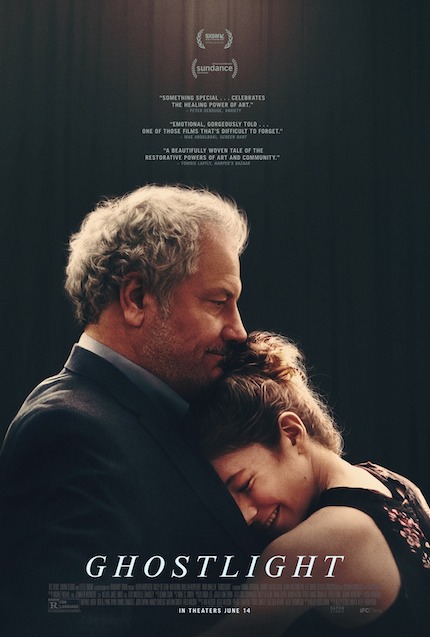GHOSTLIGHT Review: Rare Indie That Mixes LOL Humor and Heavyweight Drama
Directed by Alex Thompson and Kelly O’Sullivan, the film stars Keith Kupferer, Tara Mallen, Katherine Mallen Kupferer, and Dolly De Leon.

Coming-of-age stories are practically a sub-genre of their own. Coming-of-middle-age stories, however, tend to be, if not few and far between, then far more rare.
That’s likely due to studio perceptions of what does and doesn’t sell: young adult-oriented films, yes, non-adult-oriented films, no. Ghostlight, Kelly O'Sullivan and Alex Thompson’s follow-up to 2019’s Independent Spirit Award-nominated Saint Frances, functions, at least in part, as a coming-of-middle story for its remarkably unremarkable central character, Dan Mueller (Keith Kupferer), a man torn by loss, grief, and outdated notions of masculinity.
When we first meet Dan, a construction worker in a brightly colored vest and hard hat, he’s directing traffic on a busy Chicago street. From his faraway look, however, it’s evident Dan has other, potentially life-altering things in his life, like his deteriorating relationship with his spouse of 20 years, Sharon (Tara Mallen), or his perpetually angry, rebellious daughter, Daisy (Katherine Mallen Kupferer).
It’s just as evident that, individually and collectively, they’re a family under extreme duress and anguish. Dan, though, seems to have no idea how to help himself or his immediate family.
Pushed to place Daisy in therapy after a physical altercation with a teacher in high school, Dan still resists joining her for a session with her new therapist. Instead, he stubbornly decides to do nothing, somehow hoping that ignoring his problems and Daisy’s therapy will resolve any issues. With an impending court date on the calendar and a growing, possibly insurmountable distance between Dan and Sharon hanging over every action, reaction, and interaction, Dan seems doomed to losing both Daisy and Sharon as daily parts of his life.
It’s to O’Sullivan and Thompson’s considerable credit that withholding the “why” behind Dan and his family’s fracture doesn’t feel like a cheat, an easy manipulation of the audience’s natural curiosity and sympathy. Given Dan’s inhibited, repressed nature, it makes all the more sense that Dan doesn’t talk about his feelings, about his past, or the key event(s) that have led to so much despair, anger, and resentment among and between Dan and his family.
In a move that requires a not insignificant leap of faith for audiences in O’Sullivan and Thompson’s storytelling abilities, Dan inadvertently joins a community theater’s production of William Shakespeare’s Romeo & Juliet. Somehow unfamiliar to the working-class Dan — a narrative stretch by any means — the recalcitrant Dan slowly but surely finds a like-minded community of fellow thespians.
Led by the lone professional actor in the group, Rita (Dolly de Leon), the after-work troupe engages in a series of trust-building, character-revealing exercises that bring them together and just as importantly, help Dan take the first, tentative steps toward reconciliation with himself, his family, and his past.
Given Romeo & Juliet's over-familiarity to English-language speakers in the United States, Europe, and elsewhere, it seems nearly impossible for filmmakers — even filmmakers as gifted in comedy-drama as O'Sullivan and Thompson — to bring anything new to age-old material or centuries of interpretation by scholars, theaters, or performers. The Bard isn’t the Bard, though, unless his centuries-old works, even his most famous like Romeo & Juliet, one of his most frequently performed works, can’t be re-interpreted for different times, places, and people.
In O'Sullivan and Thompson’s hands, the story of star-crossed teen lovers becomes something else, a form of therapy for Dan (and others), an opportunity for empathy (again for Dan), and ultimately, the kind of well-earned, well-deserved opportunity for the audience on the other side of the screen for a catharsis (i.e., a good, let-it-all-out cry) of their own.
Bolstered by warmly naturalistic performances from its cast, unobtrusive direction from its filmmaking duo, and a lightly deft touch mixing laugh-out-loud humor and heavyweight drama at just the right moments, Ghostlight emerges as that rare kind of indie film, one that, like the 16th-century play at its center, speaks for, through, and to cross-demographic audiences.
Originally published when Ghostlight premiered at the 2024 Sundance Film Festival. The film opens Friday, June 14, in theaters in New York and Chicago, via IFC Films, followed by a nationwide expansion.







